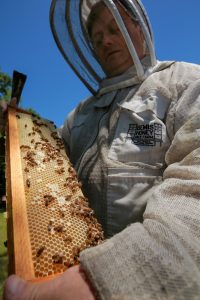Volunteer beekeeper tends bees that create more food in campus garden
By day, Peter Stuckey is a database administrator in the University of Arkansas at Little Rock’s Information Technology Services.
After work and on the weekends, the 23-year-veteran of UA Little Rock is a local beekeeper who helps to fight the global reduction of honeybees around the world.
“I started beekeeping seven years ago when I heard about Colony Collapse Disorder,” Stuckey said.
According to the Environmental Protection Agency, Colony Collapse Disorder occurs when most of a colony’s worker bees disappear while leaving a queen bee, brood, and plenty of food behind. It was first discovered during the 2006-07 winter, when beekeepers reported very high losses of 30-90 percent of their hives.
“Beekeepers were going out to where they kept their hives, and many of the colonies had collapsed,” Stuckey said. “There was a lot of concern about why the bees were dying. Among the suggestions of how to help included looking at amateur beekeeping. I started out with two hives, but I’ve got seven at this point.”
Since honeybees are essential to pollinating the food we eat, it’s especially important to maintain healthy colonies during the pollinating season.
“When we have fewer bees, less things get pollinated,” Stuckey said. “A third of the foods we eat, including a variety of fruits and vegetables, we would not have without the honeybees and their pollination. It’s been proven that there is an increase in overall production of plants when honeybees are in the area. Every spring, thousands of honeybee hives are taken to California to the almond groves. Farmers pay $200-$300 per hive because they will get that many more almonds because of it.”
In the Campus Garden, Stuckey takes care of four beehives. The honeybees pollinate the two-acre garden, which leads to more food production. Much of the food is donated to the Trojan Marketplace Food Pantry to feed students and members of the community facing food insecurity. The students who volunteer in the Campus Garden are often fascinated by the bees, which produce about 100 pounds of honey per year.

“I try to get into the hives once every two weeks. I’m looking for disease or pests, and I’m looking to make sure the queen is still there and able to produce more bees. I have to make sure they have enough room to make honey,” Stuckey said. “If students are in the garden, they put on veils and get up close and ask questions. There is definitely an interest.”
Stuckey has become the go-to guy concerning bees in the area. He’s often called in to capture feral hives or swarming bees. Swarming occurs when a new honeybee colony is formed when the queen bee leaves the colony with a large group of worker bees.
Earlier this month, Stuckey and Dr. Michael DeAngelis, associate professor in the Department of Earth Sciences, captured bees that were swarming around a piece of equipment at a construction site. They brought the bees back to the Campus Garden to recuperate, and they have now been transferred to a safe location.
For anyone interested in taking up beekeeping, Stuckey said you need a hive, smoker, hive tool, veil, and other protective gear to get started.
“To be a beekeeper, you have to get over the fear of being stung. I’ve gotten stung a lot, but it doesn’t hurt as much when you are stung in the hands. You also have to not be allergic to bees,” he said. “It’s very rewarding to see how the honeybee hives work. It’s an amazing experience to harvest honey and see what the bees can do. I highly recommend it. These little bugs give their whole lives and work so hard just to produce a little honey. Generally, it takes 12 bees their entire lives to produce one teaspoon of honey, which is less than half of what some people put in their cup of coffee.”
